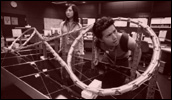God’s Puzzle
- Year
- 2008
- Original title
- Kamisama no Pazuru
- Japanese title
- 神様のパズル
- Director
- Cast
- Running time
- 135 minutes
- Published
- 15 December 2008



by Tom Mes
There has been some grumbling from the terraces of late about the recent state of one Takashi Miike, filmmaker. He who at the dawn of the millennium captured hearts and minds, and turned a few stomachs along the way, with low-budget yakuza and horror pics has these days, say some, answered the lure of big-budget-blockbusterism and neglected his original fanbase. Zebraman, The Great Yokai War, that TV series about a kid detective and his transforming cell phone - Miike seems to be aiming more for the family matinee crowd than the midnight movie maniacs these days.
If Ichi the Killer seems increasingly distant and Audition but a fading memory, a glance at Miike's filmography will set the balance straight: Big Bang Love, Juvenile A was a work of perverse art made on a V-cinema budget; Izo was a slaughterfest that dared massacre even its own audience; Sukiyaki Western Django was more retro-genrefied than any grindhouse redux. And had any director come out of the gate with the bizarre mixture of period fetish torture, extravagant ero-guro stylistics, and sock-puppetry that was Imprint, he would have been hailed the reincarnation of Teruo Ishii and spawned an instant worldwide cult.
But this nostalgia for the genre gems that Miike and so many of his compatriots churned out during the 1990s is a good thing. It forms the first step in a process that can only lead to the just recognition of that decade as ranking among the most fertile and fascinating in the history of Japanese film. Nevertheless, nostalgia it remains. To wish for Miike to go back to cranking out Dead or Alives and Auditions on a bi-monthly basis is like wishing for tomatoes to still taste the way they did before your country joined the European Union - that era, I'm afraid, has passed.
It is not Takashi Miike that has changed, but the industry around him. There simply is hardly any room in the Japanese film business today for the kind of low-to-medium-budget genre quickies that reversed its fortunes in the previous decade. At the start of the new millennium, the video market that was the foundation of this particular brand of filmmaking began to wane. If DVD - which caught on with some delay in Japan because of the well-developed laserdisc scene - provided a brief boost that led to more ambitious productions like the Dead or Alive series, competition from other media such as video games and cell phones, and an overall lack of creative marketing on the part of distributors (see our interview with veteran V-cinema producer Yoshinori Chiba for a background on the demise) led to waning audiences, plummeting budgets and diminishing quality. Today it takes quite a search to even find the once prominent 'New Yakuza' section at one's local Tsutaya.
Takashi Miike too has moved on, going from marginal to mainstream and to a succession of hit films. More power to him, I say, because despite the budgetary inflation, at heart he hasn't changed at all: Miike continues to put the same spin on family-friendly fare that he used to apply to cookie-cutter yakuza scripts. Who else could have made The Great Yokai War, in which ancient monsters go joyriding on mushroom clouds and policemen clumsily put bullets in each other's heads? Who else could have made Zebraman, with its Visitor Q-like dysfunctional family and big-screen lead role for video king Sho Aikawa? And who else would have dared to strive for box office pay dirt with a sci-fi disaster action epic with no villains whose first hour consists almost exclusively of classroom talk about physics and the creation of the universe?
Takashi Miike's films have always demanded sacrifices from their audiences, and God's Puzzle, the epic in question, is no different. Its story begins when one half of a pair of physically identical, but mentally opposite twins (both played by Ichihara) decides to pursue his paramour to India, despite being mere weeks away from his university graduation. With a quick phone call, he asks his brother Motokazu to take his place. That said brother's sole talent consists of playing his electric guitar with the same enthusiasm and lack of skill as Bill & Ted should not prove a hurdle: all he has to do to pocket a diploma is attend class. Motokazu's excellent adventure begins, however, when a teacher asks him to persuade a female classmate - a reclusive, precocious genius (Tanimura) - to leave her room and attend class. He succeeds, but only by promising to team up with the genius for a science project that would leave Einstein scratching his head: to recreate the origins of life in the universe under laboratory conditions. Additional problem: if they succeed, their experiment may swallow our current universe up whole.
This involves a lot of talking. Unfortunately much of this is done by Hayato Ichihara, male talento du jour and possibly the worst screen actor on yonder side of the Ural mountains (or the Bering Strait, depending on your geographical location). However, those who manage to hang on for those first sixty minutes, for example by latching on to the frequent shots of co-star Mitsuki Tanimura's barely-legal curves (although the numerous walkouts during the film's international unveiling at the Cannes market last May and the film's subsequent absence from the festival scene suggest that this wasn't enough for most programmers and other decision makers to forget about their overcharged calendars), will be rewarded with a most spectacular and enjoyable second half that serves up a mixture of sci-fi disaster movie and romance that in the end makes God's Puzzle the movie Andromedia should have been.
This does not sound like much, perhaps. But then again, from a director who has always been the first to admit that his films can be hit and miss, it does underline that business is still as usual. In more ways than one, because, as is so often the case with a Miike film, a closer look proves to be most rewarding. The devotee will recognize in God's Puzzle's obsession with the creation, annihilation and meaning of life a continuation of the questions posed in earlier films by the director. Dead or Alive 2's interrogations 'Where are you?' and 'Where are you going?' were, if not exactly answered, then at last echoed in the metaphysical inclinations of Izo and Big Bang Love, Juvenile A.
The presence of screenwriter Masaru Nakamaru has something to do with this. He wrote DOA2 and Big Bang Love (as well as having a hand in Andromedia) and it is also he who penned God's Puzzle. With titles like The Way to Fight (Kenka no Hanamichi, 1996), the Young Thugs (Kishiwada Shonen Gurentai 1997-98) films and The Bird People in China (1997) on his résumé, Nakamura has not only scripted some of the best but also some of the most crucial films in the Miike cannon.
Those who thought they saw a black hole approaching on their radar screens can rest assured: this is still the familiar Miike universe. We are merely exploring different corners.